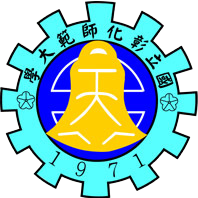SDG16.3.3 Participation in government research
NCUE comprises seven colleges: Arts, Science, Engineering, Education, Management, Technology and Vocational Education, and Social Sciences and Physical Education. All colleges actively participate in government policy research projects to develop key policies or assist government departments in formulating policies and implementing strategies. Descriptions of some of the policy-oriented research conducted by the faculty members with the government departments follow:
According to statistics, NCUE faculty members in various departments are regularly commissioned by the government to design and implement policy-related projects. In 2021, the total number of cases reached 42, and the total commission fund reached 146.61113 million (for details, please refer to https://rnd.ncue.edu.tw/files/90-1002-23.php). Eleven faculty members implemented 12 policy-focused projects with the government. In addition, NCUE’s Innovation Incubation Centre of the Research and Development Department implemented the “Science and Technology Care Project to Support Small and Medium-sized Enterprises” and the “Industry Guidance for Innovation in Industrial Parks Project.”
1. Assisting the government in implementing a research programme focused on reducing inequalities
1.1 Professor I-Chun Huang from the Graduate Institute of Rehabilitation Counseling implemented the “Using Action Research to Develop a Web-based Geographic Information System for the Employment Side in the Vocational Rehabilitation Services” project of the Ministry of Science and Technology, which used the framework of Web GIS and Google Maps to develop a web-based geographic information system for employment in vocational rehabilitation services, with the aim of facilitating professional communication and information exchange in the provision of vocational rehabilitation services and improving service quality.
Link: https://www.grb.gov.tw/search/planDetail?id=13871753
1.2 Ming-Hung Wang, Professor at the Graduate Institute of Rehabilitation Counseling, implemented the “2020 Taichung-Changhua-Nantou Vocational Rehabilitation Service Resource Center for People with Disabilities” project of the Ministry of Labor, to help improve the quality of occupational rehabilitation services in the region and help people with disabilities obtain suitable jobs. During the implementation, we cooperated with regional NGOs, local governments, and departments of the central government.
Link: https://vrrc.heart.net.tw/
2. Helping the government implement research projects that focus on “Good Health and Well-being” policies:
2.1 Yu-Chung Wei, Professor at the Graduate Institute of Statistics and Information Science, implemented the “Integrated Genomic Analysis via Deep Learning for Phenotype Prediction” project of the Ministry of Science and Technology to examine the relationship between genetics and diseases using deep learning algorithms.
2.2 Yu-Chung Wei, Professor at the Graduate Institute of Statistics and Information Science, implemented the “Effect of Sit-To-Stand Intervention in the Intensive Care Unit Survivors: a Randomized Controlled Trial” project of the Ministry of Science and Technology to examine the effect of nursing intervention to the recovery of patients in intensive care units.
LINK: https://www.grb.gov.tw/search/planDetail?id=14505491
2.3 Hsin-Min Wang, Associate Professor at the Department of Sports, implemented the “Chronic Response of Knee Articular Cartilage in Volleyball Athletes: A Competitive Season” project. By monitoring the thickness of knee articular cartilages, the effect of exercise loads on lean knee articular cartilages was examined. The relevant influencing factors were also examined to provide insights useful for future exercise prescription designs.
2.4 Jong-Chang Tsai, Professor at the Department of Sports, implemented the “2020 Pilot Program of Assisting Grassroots Athletes with Sports Science” project of the Sports Administration of the Ministry of Education. It assisted 416 track and field athletes from primary and secondary schools in Taichung, Changhua, and Nantou areas by providing radar charts of physical and physical fitness assessments and offering advice on training, thus providing a reference that coaches can use to nurture talents and train players.
3. Helping the government implement research projects that focus on “Quality Education” policies:
3.1 Hsiao-Lin Tuan, Professor at the Graduate Institute of Science Education, implemented the “Project to Improve the Ability of Primary and Junior High School Natural Science Teachers in Examine Curriculum Design and Implementation” of the K-12 Education Administration, Ministry of Education to equip seeded teachers with curriculum design, implementation, and self-reflection skills.
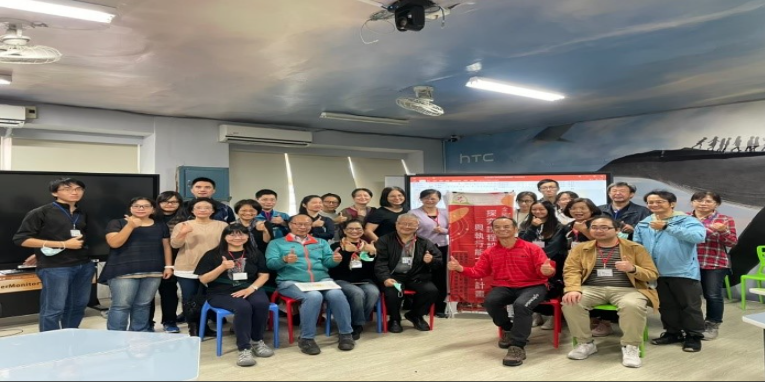
Figure 1: Prof. Hsiao-Lin Tuan led teachers in examining curriculum designs.
3.2 Sung-Pei Chien, Professor at the Graduate Institute of Science Education, implemented the “An Exploratory Study of Pre-Service Teachers’ Beliefs about Technology-Based Assessments, Their Intentions to Use These Assessments, and the Relationships among Them” project of the Ministry of Science and Technology. This was a series of exploratory studies examining per-service teachers’ beliefs about technology-based assessments and their effect on the teachers’ intention to use them.
- Appendix: 16.3.3A- Midterm report of Prof. Sung-Pei Chien
3.3 Sung-Pei Chien, Professor at the Department of Guidance and Counseling, implemented the “Research on the Development and Effects of Using Smart Chatbots in Empathy Training Courses” project of the Ministry of Science and Technology. In the study, users could use more diverse methods as they practiced empathy skills. The research process increased the multifaceted functions of chatbots, allowing them to record users’ emotions, expressions, and fluctuations; they could also engage in audio dialogues and talk with the users, so as to assess their empathy level and ability to use empathy.
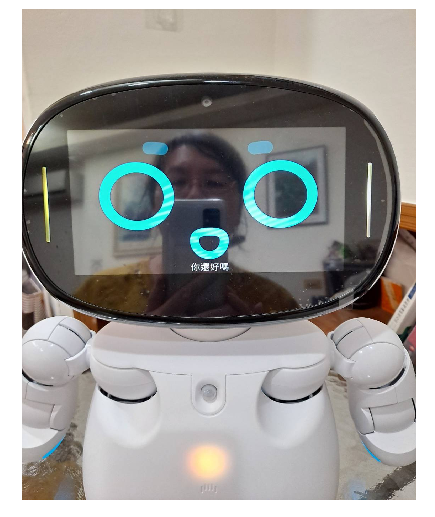
Figure 2: An intelligent robot
LINK: https://www.grb.gov.tw/search/planDetail?id=13862322
3.4 Tsuei-Yuan Lai, Professor at the Department of Special Education, implemented the “Talents Cultivation Program with Teaching Materials and Teaching Methods of the University-An Exploration of Integrating Design Thinking into the Special Needs Curriculum for Elementary Gifted Students,” in which the process of design thinking was used to develop cross-discipline courses that integrated the development of creativity and affectivity and enabled gifted elementary students to understand the design thinking process.
Link: https://drive.google.com/open?id=1zWOdZ6dFvKHUNFs8kcdJQEpVRC-RAPvj
4. Helping the government implement research projects focused on “Affordable and Clean Energy” policies:
Chia-Jyi Liu, Professor at the Department of Physics, implemented the “Energy-Efficient Synthesis, Microstructure and Transport Property Characterization of Green Thermoelectric Materials” project. This project sought to synthesize potential thermoelectric materials in an energy-efficient way. It systematically examined the chemical reaction and physical mechanisms and analyzed the parameters of the materials using the SPBcal or SKBcal algorithm we had developed so as to adjust the material composition, composite composition, and process conditions, and obtain materials with similar or better zT values.
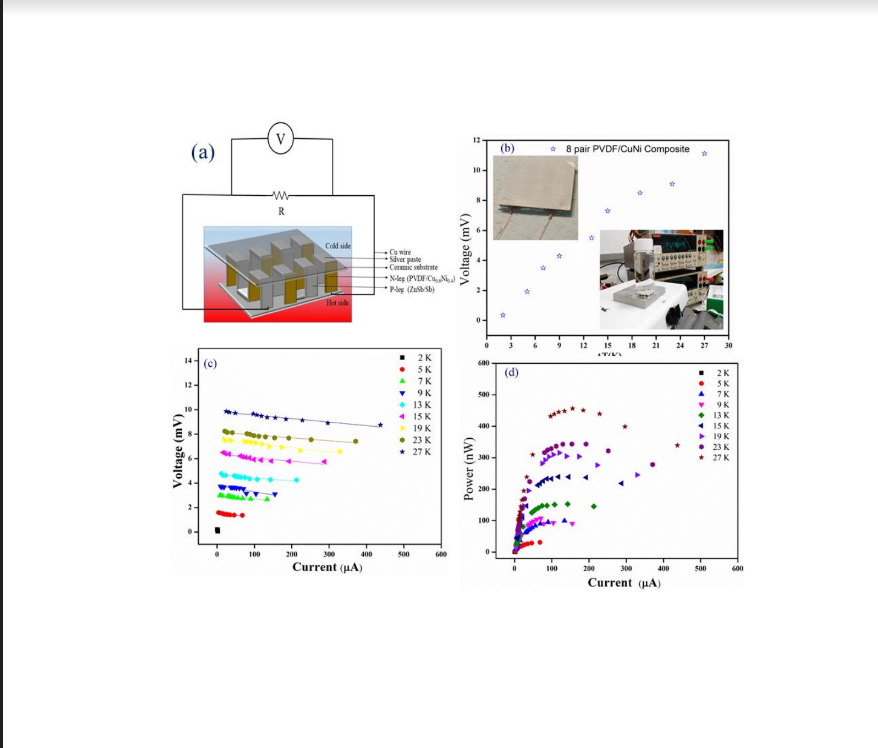
Figure 3: Professor Chia-Jyi Liu’s research results (1)
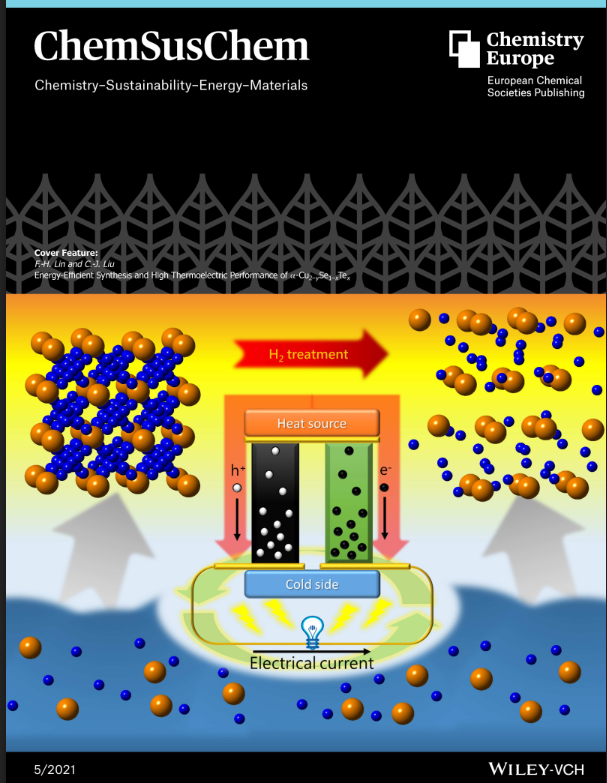
Figure 4: Professor Chia-Jyi Liu’s research results (2)
5. Director Yang-Wei Lin of the Teaching Excellence Centre implements the ‘Higher Education Sprout Project’ of the Ministry of Education.
5.1 Policies and Plans: The second phase (2020–2022) of the University Social Responsibility (USR). Projects: ‘Shetou Sock Projects: Innovation, Entrepreneurship, Revitalisation’; ‘Deep cultivation in Fangyuan and Joining Hands in Dacheng: Changhua Twin Cities’ Industrial and Environmental Sustainability’ and ‘Baisha x Common Good Education: Twelve-Year Compulsory Education project in Rural Areas’.
5.2 Empirical evidence and results: NCUE’s USR projects have unique characteristics. The Teaching Excellence Centre continues to strengthen the support system and encourage faculty members and students to study and propose USR-related research plans on teaching practices and participate in project-based practical courses that can solve local problems. The projects integrate the concepts of corporate social responsibility (CSR) and environmental, social, and corporate governance (ESG) to realize the United Nations’ SDGs, effectively driving faculty members and students to solve local issues for win–win situations in sustainable development and the circular economy.
This achievement report has been made public, please refer to the website: https://sites.google.com/gm.ncue.edu.tw/ncueable/%E6%88%90%E6%9E%9C%E5%B0%88%E5%8D%80
6. In the 2021 academic year, NCUE’s Innovation Incubation Centre of the Research and Development Department implemented the “Science and Technology Care Project to Support Small and Medium-sized Enterprises” and "Industry Guidance for Innovation in Industrial Parks” projects on behalf of the Ministry of Economic Affairs, and helped enterprises to obtain subsidies from the government. The results of the guidance are as follows:
6.1 Science and Technology Care Project to Support Small and Medium-sized Enterprises
6.1.1 Participating enterprises/experts and scholars/students: 15/15/26
6.1.2 New product/Technology development: 3 cases
6.1.3 Technical and talent training courses: 2 sessions
6.1.4 Applications for government subsidies: 4 applications/2 approved, with a total subsidy of 1.048 million NTD
6.1.5 Patent application and utilization: 3 cases
6.1.6 National competition: 5 cases
6.2 Industry Guidance for Innovation in Industrial Parks Project
6.2.1 Participating enterprises/experts and scholars: 80/20
6.2.2 Technical guidance: 11 cases
6.2.3 Technical and talent training courses: 4 sessions
6.2.4 Applications for government subsidies: 2 applications, applying for a total subsidy of 4.653715 million
6.2.5 Productions based on student projects: 6 cases
6.2.6 Student internships: 28 people
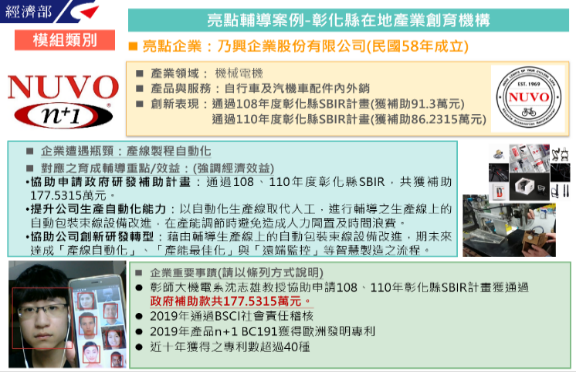
Guidance case – Nuvo terprise Co., Ltd.
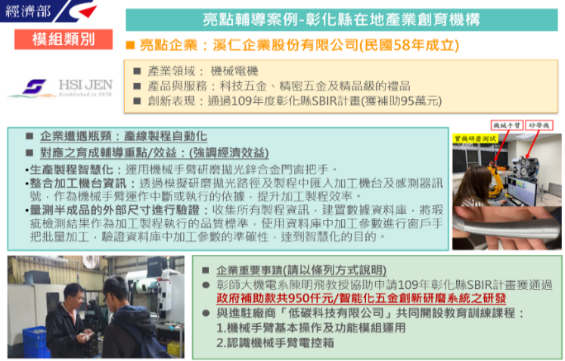
Guidance case – Hsi Jen Enterprise Co., Ltd.
